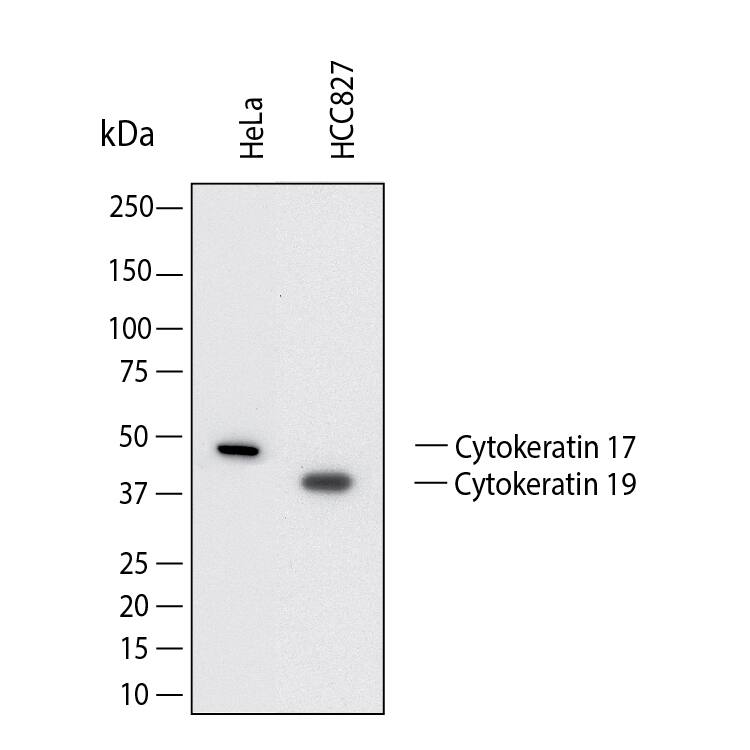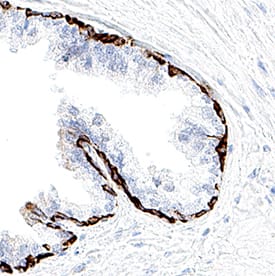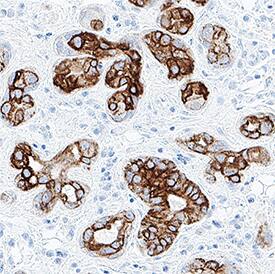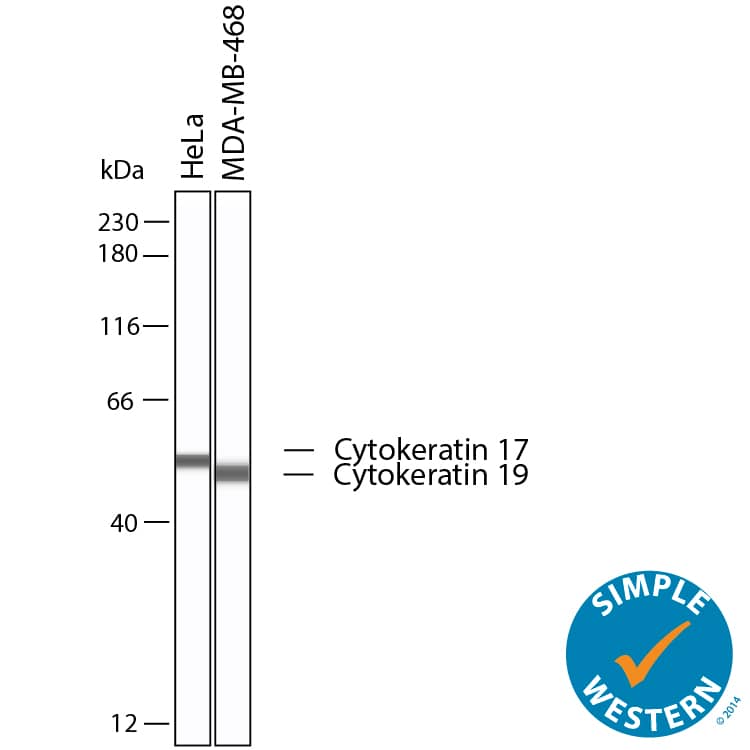Human Cytokeratin 17/19 Antibody
R&D Systems, part of Bio-Techne | Catalog # MAB11568


Conjugate
Catalog #
Key Product Details
Species Reactivity
Human
Applications
Immunohistochemistry, Simple Western, Western Blot
Label
Unconjugated
Antibody Source
Monoclonal Mouse IgG Clone # 1080201
Product Specifications
Immunogen
Cytokeratin 17/19 containing synthetic peptide
Accession # Q04695
Accession # Q04695
Specificity
Detects a synthetic peptide around aa 123 in Direct ELISA.
Clonality
Monoclonal
Host
Mouse
Isotype
IgG
Scientific Data Images for Human Cytokeratin 17/19 Antibody
Detection of Human Cytokeratin 17/19 by Western Blot.
Western Blot shows lysates of HeLa human cervical epithelial carcinoma cell line and HCC827 human non-small cell lung cancer cell line. PVDF membrane was probed with 2 µg/ml of Mouse Anti-Human Cytokeratin 17/19 Monoclonal Antibody (Catalog # MAB11568) followed by HRP-conjugated Anti-Mouse IgG Secondary Antibody (Catalog # HAF018). Specific bands were detected for Cytokeratin 17 at approximately 48 kDa and for Cytokeratin 19 at approximately 41 kDa (as indicated). This experiment was conducted under reducing conditions and using Western Blot Buffer Group 1.Detection of Cytokeratin 17/19 in Human Prostate.
Cytokeratin 17/19 was detected in immersion fixed paraffin-embedded sections of human prostate using Mouse Anti-Human Cytokeratin 17/19 Monoclonal Antibody (Catalog # MAB11568) at 5 µg/ml for 1 hour at room temperature followed by incubation with the Anti-Mouse IgG VisUCyte™ HRP Polymer Antibody (Catalog # VC001) or the HRP-conjugated Anti-Mouse IgG Secondary Antibody (Catalog # HAF007). Before incubation with the primary antibody, tissue was subjected to heat-induced epitope retrieval using VisUCyte Antigen Retrieval Reagent-Basic (Catalog # VCTS021). Tissue was stained using DAB (brown) and counterstained with hematoxylin (blue). Specific staining was localized to the membrane of basal cells. View our protocol for Chromogenic IHC Staining of Paraffin-embedded Tissue Sections.Detection of Cytokeratin 17/19 in Human Squamous Cell Carcinoma.
Cytokeratin 17/19 was detected in immersion fixed paraffin-embedded sections of human squamous cell carcinoma using Mouse Anti-Human Cytokeratin 17/19 Monoclonal Antibody (Catalog # MAB11568) at 5 µg/ml for 1 hour at room temperature followed by incubation with the Anti-Mouse IgG VisUCyte™ HRP Polymer Antibody (Catalog # VC001) or the HRP-conjugated Anti-Mouse IgG Secondary Antibody (Catalog # HAF007). Before incubation with the primary antibody, tissue was subjected to heat-induced epitope retrieval using VisUCyte Antigen Retrieval Reagent-Basic (Catalog # VCTS021). Tissue was stained using DAB (brown) and counterstained with hematoxylin (blue). Specific staining was localized to the membrane. View our protocol for Chromogenic IHC Staining of Paraffin-embedded Tissue Sections.Applications for Human Cytokeratin 17/19 Antibody
Application
Recommended Usage
Immunohistochemistry
3-25 µg/mL
Sample: Immersion fixed paraffin-embedded sections of human prostate and human squamous cell carcinoma
Sample: Immersion fixed paraffin-embedded sections of human prostate and human squamous cell carcinoma
Simple Western
20 µg/mL
Sample: HeLa human cervical epithelial carcinoma cell line and MDA-MB-468 human breast cancer cell line
Sample: HeLa human cervical epithelial carcinoma cell line and MDA-MB-468 human breast cancer cell line
Western Blot
2 µg/mL
Sample: HeLa human cervical epithelial carcinoma cell line and HCC827 human non-small cell lung cancer cell line
Sample: HeLa human cervical epithelial carcinoma cell line and HCC827 human non-small cell lung cancer cell line
Formulation, Preparation, and Storage
Purification
Protein A or G purified from hybridoma culture supernatant
Reconstitution
Reconstitute lyophilized material at 0.2mg/ml in sterile PBS. For liquid material, refer to CoA for concentration.
Formulation
Lyophilized from a 0.2 μm filtered solution in PBS with Trehalose.
Shipping
Lyophilized product is shipped at ambient temperature. Liquid small pack size (-SP) is shipped with polar packs. Upon receipt, store immediately at the temperature recommended below.
Stability & Storage
Use a manual defrost freezer and avoid repeated freeze-thaw cycles.
- 12 months from date of receipt, -20 to -70 °C as supplied.
- 1 month, 2 to 8 °C under sterile conditions after reconstitution.
- 6 months, -20 to -70 °C under sterile conditions after reconstitution.
Background: Cytokeratin 17/19
References
- Tang S, Liu W, Yong L, Liu D, Lin X, Huang Y, Wang H, Cai F. Reduced Expression of KRT17 Predicts Poor Prognosis in HER2high Breast Cancer. Biomolecules. 2022 Aug 25;12(9):1183. doi: 10.3390/biom12091183. PMID: 36139022; PMCID: PMC9496156.
- Hu H, Xu DH, Huang XX, Zhu CC, Xu J, Zhang ZZ, Zhao G. Keratin17 Promotes Tumor Growth and is Associated with Poor Prognosis in Gastric Cancer. J Cancer. 2018 Jan 1;9(2):346-357. doi: 10.7150/jca.19838. PMID: 29344281; PMCID: PMC5771342.
- Li D, Ni XF, Tang H, Zhang J, Zheng C, Lin J, Wang C, Sun L, Chen B. KRT17 Functions as a Tumor Promoter and Regulates Proliferation, Migration and Invasion in Pancreatic Cancer via mTOR/S6k1 Pathway. Cancer Manag Res. 2020 Mar 19;12:2087-2095. doi: 10.2147/CMAR.S243129. PMID: 32256116; PMCID: PMC7090205.
Alternate Names
CK-19, K1CS, keratin 19, type I, KRT17
Gene Symbol
Q04695
UniProt
Additional Cytokeratin 17/19 Products
Product Documents for Human Cytokeratin 17/19 Antibody
Product Specific Notices for Human Cytokeratin 17/19 Antibody
For research use only
